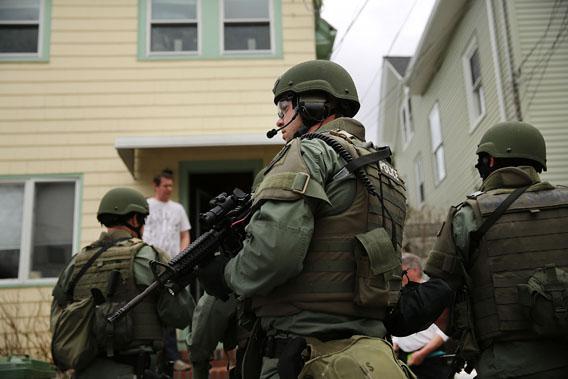WATERTOWN, Mass.—As SWAT teams moved from house to house, asking residents if they could come inside to search for fugitive Boston Marathon bombing suspect Dzhokar Tsarnaev, residents of Arlington Street went to the sidewalk to watch the proceedings and talk about the events of the last 15 hours.
“To turn on the national news and see your 7-Eleven, your Dunkin Donuts on national TV… it’s sort of terrifying,” said Mark Robertson, who was walking his dog after SWAT teams searched his house. Robertson said police told him they were going from house to house, and that he should make sure everything was unlocked. “There’s a couple guys in front, some in back, checking the shed,” he said, pointing. Robertson learned of last night’s conflagration via phone calls from neighbors. Despite his house’s proximity to School Street, where much of last night’s action took place, he didn’t hear any gunshots or explosions.
“My cat woke me up around 12:30, 12:35,” said a sixty-something female resident of the Apartments at Coolidge School, who asked not to be named. “Five minutes later, police cars started zooming in every direction. I guess she heard it farther away than I did.” The woman’s cat wasn’t the only animal affected by last night’s noise: “[My dog] crapped all over the apartment, he was so scared,” said a man in a wheelchair. Neither had slept since being woken by the sirens last night. “You get extra adrenaline, I guess,” said the woman.
Sisters Melissa and Natasha Lee and their neighbor, Josie Jones, were still awake when the police came to town last night. (“It wasn’t that late for us,” Melissa Lee said.) The Lees and Jones, like every other Arlington Street resident, were surprised that all this noise and gunplay came to Watertown, a quiet community where, they say, everyone knows everyone else. “We could’ve been walking our dog at the time,” said Melissa Lee.
Their first thought was to get to safety. “Should we take cover?” the Lee sisters remember thinking. “We thought, Oh my God, being up next to the windows probably isn’t safe.” They say they stopped being worried around 3 a.m., when fatigue set in. “We still thought we had to go to work the next day,” Melissa Lee said. They didn’t, of course. “At least we get the day off,” she said.
Henry Aime Amar, a realtor, was scheduled to close on two houses today, at 11:30 and 3:00 p.m. Instead, he joined the rest of his neighbors on the sidewalk to gawk as an armored car marked “Cape Cod Police” drove down the block with about a dozen heavily armored police officers hanging off of both sides. “My lawyer is like, ‘What are you doing on the street? It’s illegal to be out?’ My answer is, ‘You’re a Boston liberal democrat. I’m French. Leave me alone.’ ” Amar has been following the news on French television and by reading the French newspaper Le Monde—sources that, he says, have been giving better information than police and community officials. He says he saw on the Le Monde website that the Brookline Bridge was closed. “My neighbor, the ex-chief of police of Watertown, he didn’t believe me,” Amar remembers. “He was like, ‘I don’t believe ya, Henry. You’re pulling my leg.’ “
Amar’s house hadn’t yet been searched, but he and another neighbor, who was sitting astride a bicycle, watched as cops went through the houses closer to Mount Auburn Street. “You know the philosopher Žižek?” the other man said, remembering that, after the September 11 attacks, Slavoj Žižek wrote a book called Welcome to the Desert of the Real, in which he observed that the actual consequences of attacks like the Boston Marathon bombing are far less significant than the symbolic consequences. “In the end, three people died because of the bombing,” the neighbor noted. “But the real result is that we become acclimated to stuff like this.” He gestured across the street, as about ten cops in camouflage SWAT gear swarmed outside a house, holding rifles, preparing to go inside. While the show of force may have signaled that the immediate physical danger had passed, it didn’t bring either man peace of mind. “It just means they have no clue now where he is,” Amar said.
